Multidisciplinary and Tailored Treatment of Locally Advanced Breast Cancer in Progression during Neoadjuvant Chemotherapy: Case Report
Abstract
1. Introduction
2. Case Presentation
3. Discussion
| Authors and References | Title of Paper | Study Design | Main Findings |
|---|---|---|---|
| Whitman GJ, Strom EA [2] | Workup and Staging of Locally Advanced Breast Cancer | Review | In patient with LABC, accurate workup and staging evaluations are extremely important in facilitating appropriate multidisciplinary treatment. |
| Petrelli F, Coinu A, Lonati V et al. [9] | Neoadjuvant dose-dense chemotherapy for locally advanced breast cancer: a meta-analysis of published studies | Meta-analysis | Dose-dense NAC, despite not leading to a significant increase in survival, increases the possibility of achieving a pathologic complete response (pCR) in operable and LABC by 46.7%. |
| Gianni L, Eiermann W, Semiglazov V et al. [10] | Neoadjuvant chemotherapy with trastuzumab followed by adjuvant trastuzumab versus neoadjuvant chemotherapy alone, in patients with HER2-positive locally advanced breast cancer (the NOAH trial): a randomised controlled superiority trial with a parallel HER2-negative cohort | Randomized controlled superiority trial | Trastuzumab significantly improved event-free survival in patients with HER2-positive breast cancer. |
| Raphael J, Paramsothy T, Li N, Lee J, Gandhi S [13] | A single-institution experience of salvage therapy for patients with early and locally advanced breast cancer who progress during neoadjuvant chemotherapy | Retrospective cohort study | Patients progressing on NAT responded well to ST, became operable, and had promising survival outcomes. Appropriate selection of ST is crucial. |
| Tryfonidis K, Senkus E, Cardoso MJ, Cardoso F [20] | Management of locally advanced breast cancer—perspectives and future directions | Review | Optimal management of LABC requires a multidisciplinary approach, a well-coordinated treatment schedule, and close cooperation between medical, surgical, and radiation oncologists. |
| Touboul E, Buffat L, Lefranc JP et al. [21] | Possibility of conservative local treatment after combined chemotherapy and preoperative irradiation for locally advanced noninflammatory breast cancer | Prospective study | Induction chemotherapy followed by preoperative irradiation may permit the selection of some patients with locally advanced breast cancer for conservative treatment. However, the impact of this treatment modality on long-term survival remains to be established. |
| Roininen N, Haapasaari KM Karihtala P [33] | The role of redox-regulating enzymes in inoperable breast cancers treated with neoadjuvant chemotherapy | Retrospective observational study | Redox-regulating enzymes may serve as potential prognostic factors in primarily inoperable breast cancer patients. |
4. Conclusions
Author Contributions
Funding
Institutional Review Board Statement
Informed Consent Statement
Data Availability Statement
Conflicts of Interest
References
- ESO. ESMO International Consensus Guidelines for Advanced Breast Cancer ABC5; ESMO: Lugano, Switzerland, 2020. [Google Scholar]
- Whitman, G.J.; Strom, E.A. Workup and Staging of Locally Advanced Breast Cancer. Semin. Radiat. Oncol. 2009, 19, 211–221. [Google Scholar] [CrossRef]
- Ali, H.R.; Dawson, S.J.; Blows, F.M.; Provenzano, E.; Pharoah, P.D.; Caldas, C. Cancer stem cell markers in breast cancer: Pathological, clinical and prognostic significance. Breast Cancer Res. 2011, 13, 6. [Google Scholar] [CrossRef]
- Ma, C.X.; Reinert, T.; Chmielewska, I.; Ellis, M.J. Mechanisms of aromatase inhibitor resistance. Nat. Rev. Cancer 2015, 15, 261–275. [Google Scholar] [CrossRef]
- Rugo, H.S.; Barry, W.T.; Moreno-Aspitia, A.; Lyss, A.P.; Cirrincione, C.; Leung, E.; Mayer, E.L.; Naughton, M.; Toppmeyer, D.; Carey, L.A.; et al. Randomized phase III trial of paclitaxel once per week compared with nanopar-ticle albumin-bound nab-paclitaxel once per week or ixabepilone with bevacizumab as first-line chemotherapy for locally re-current or metastatic breast cancer: CALGB 40502/NCCTG N063H (Alliance). J. Clin. Oncol. 2015, 33, 2361–2369. [Google Scholar]
- Rastogi, P.; Anderson, S.J.; Bear, H.D.; Geyer, C.E.; Kahlenberg, M.S.; Robidoux, A.; Margolese, R.G.; Hoehn, J.L.; Vogel, V.G.; Dakhil, S.R.; et al. Preoperative chemotherapy: Updates of national surgical adjuvant breast and bowel project protocols B-18 and B-27. J. Clin. Oncol. 2008, 26, 778–785. [Google Scholar] [CrossRef]
- King, T.A.; Morrow, M. Surgical issues in patients with breast cancer receiving neoadjuvant chemotherapy. Nat. Rev. Clin. Oncol. 2015, 12, 335–343. [Google Scholar] [CrossRef]
- Santa-Maria, C.A.; Camp, M.; Cimino-Mathews, A.; Harvey, S.; Wright, J.; Stearns, V. Neoadjuvant Therapy for Early-Stage Breast Cancer: Current Practice, Controversies, and Future Directions. Oncology 2015, 29, 828–838. [Google Scholar]
- Petrelli, F.; Coinu, A.; Lonati, V.; Cabiddu, M.; Ghilardi, M.; Borgonovo, K.; Barni, S. Neoadjuvant dose-dense chemotherapy for locally advanced breast cancer: A meta-analysis of published studies. Anti-Cancer Drugs 2016, 27, 702–708. [Google Scholar] [CrossRef]
- Gianni, L.; Eiermann, W.; Semiglazov, V.; Manikhas, A.; Lluch, A.; Tjulandin, S.; Zambetti, M.; Vazquez, F.; Byakhow, M.; Lichinitser, M.; et al. Neoadjuvant chemotherapy with trastuzumab followed by adjuvant trastuzumab versus neoadjuvant chemotherapy alone, in patients with HER2-positive locally advanced breast cancer (the NOAH trial): A randomised controlled superiority trial with a parallel HER2-negative cohort. Lancet 2010, 375, 377–384. [Google Scholar]
- Korde, L.A.; Somerfield, M.R.; Carey, L.A.; Crews, J.R.; Denduluri, N.; Hwang, E.S.; Khan, S.A.; Loibl, S.; Morris, E.A.; Perez, A.; et al. Neoadjuvant chemotherapy, endocrine therapy, and targeted therapy for breast cancer: ASCO guideline. J. Clin. Oncol. 2021, 39, 1485–1505. [Google Scholar] [CrossRef]
- Caudle, A.S.; Gonzalez-Angulo, A.M.; Hunt, K.K.; Liu, P.; Pusztai, L.; Symmans, W.F.; Kuerer, H.M.; Mittendorf, E.A.; Hortobagyi, G.N.; Meric-Bernstam, F. Predictors of tumor progression during neoadjuvant chemotherapy in breast cancer. J. Clin. Oncol. 2010, 28, 1821–1828. [Google Scholar] [CrossRef]
- Raphael, J.; Paramsothy, T.; Li, N.; Lee, J.; Gandhi, S. A single-institution experience of salvage therapy for patients with early and locally advanced breast cancer who progress during neoadjuvant chemotherapy. Breast Cancer Res. Treat. 2017, 163, 11–19. [Google Scholar] [CrossRef]
- An, J.; Peng, C.; Tang, H.; Liu, X.; Peng, F. New advances in the research of resistance to neoadjuvant chemotherapy in breast cancer. Int. J. Mol. Sci. 2021, 22, 9644. [Google Scholar] [CrossRef]
- Zattarin, E.; Leporati, R.; Ligorio, F.; Lobefaro, R.; Vingiani, A.; Pruneri, G.; Vernieri, C. Hormone Receptor Loss in Breast Cancer: Molecular Mechanisms, Clinical Settings, and Therapeutic Implications. Cells 2020, 9, 2644. [Google Scholar] [CrossRef]
- Galli, G.; Bregni, G.; Cavalieri, S.; Porcu, L.; Baili, P.; Hade, A.; Di Salvo, F.; Sant, M.; Agresti, R.; Gennaro, M.; et al. Neoadjuvant Chemo-therapy Exerts Selection Pressure Towards Luminal Phenotype Breast Cancer. Breast Care 2017, 12, 391–394. [Google Scholar] [CrossRef]
- Lindström, L.; Yau, C.; Czene, K.; Thompson, C.; Hoadley, K.; Van’t Veer, L.; Balassanian, R.; Bishop, J.; Carpenter, P.; Chen, Y.; et al. Intratumor heterogeneity of the estrogen receptor and the long-term risk of fatal Breast cancer. J. Natl. Cancer Inst. 2018, 110, 726–733. [Google Scholar] [CrossRef]
- Monrigal, E.; Dauplat, J.; Gimbergues, P.; Le Bouedec, G.; Peyronie, M.; Achard, J.; Chollet, P.; Mouret-Reynier, M.; Nabholtz, J.; Pomel, C. Mastectomy with immediate breast reconstruction after neoadjuvant chemotherapy and radiation therapy. A new option for patients with operable invasive breast cancer. Results of a 20 years single institution study. Eur. J. Surg. Oncol. 2011, 37, 864–870. [Google Scholar] [CrossRef]
- Paillocher, N.; Florczak, A.S.; Richard, M.; Classe, J.M.; Oger, A.S.; Raro, P.; Wernert, R.; Lorimier, G. Evaluation of mastectomy with immediate autologous latissimus dorsi breast re-construction following neoadjuvant chemotherapy and radiation therapy: A single institution study of 111 cases of invasive breast carcinoma. Eur. J. Surg. Oncol. 2016, 42, 949–955. [Google Scholar] [CrossRef] [PubMed]
- Tryfonidis, K.; Senkus, E.; Cardoso, M.J.; Cardoso, F. Management of locally advanced breast cancer—Perspectives and future directions. Nat. Rev. Clin. Oncol. 2015, 12, 147–162. [Google Scholar] [CrossRef]
- Touboul, E.; Buffat, L.; Lefranc, J.-P.; Blondon, J.; Deniaud, E.; Mammar, H.; Laugier, A.; Schlienger, M. Possibility of conservative local treatment after combined chemotherapy and preoperative irradiation for locally advanced noninflammatory breast cancer. Int. J. Radiat. Oncol. 1996, 34, 1019–1028. [Google Scholar] [CrossRef]
- Joseph, E.; Hamori, C.A.; Bergman, S.; Roar, E.; Swann, N.F.; Anastasi, G.W. A prospective randomized trial of VAC vs. standard therapy of chronic nonhealing wounds. Wounds 2000, 12, 60–67. [Google Scholar]
- Eginton, M.T.; Brown, K.R.; Seabrook, G.R.; Towne, J.B.; Cambria, R.A. A prospective randomized evaluation of negative-pressure wound dressings for diabetic foot wounds. Ann. Vasc. Surg. 2003, 17, 645–649. [Google Scholar] [CrossRef]
- Morykwas, M.J.; Argenta, L.C.; Shelton-Brown, E.I.; McGuirt, W. Vacuum-assisted closure: A new method for wound control and treatment: Animal studies and basic foundation. Ann. Plast. Surg. 1997, 38, 553–562. [Google Scholar] [CrossRef]
- Mouës, C.M.; Vos, M.C.; Bemd, G.C.V.D.; Stijnen, T.; Hovius, S.E. Bacterial load in relation to vacuum-assisted closure wound therapy: A prospective randomized trial. Wound Repair Regen. 2004, 12, 11–17. [Google Scholar] [CrossRef]
- Mouës, C.; Bemd, G.v.D.; Heule, F.; Hovius, S. Comparing conventional gauze therapy to vacuum-assisted closure wound therapy: A prospective randomised trial. J. Plast. Reconstr. Aesthetic Surg. 2007, 60, 672–681. [Google Scholar] [CrossRef]
- Cortazar, P.; Zhang, L.; Untch, M.; Mehta, K.; Costantino, J.P.; Wolmark, N.; Bonnefoi, H.; Cameron, D.; Gianni, L.; Valagussa, P.; et al. Pathological complete response and long-term clinical benefit in breast cancer: The CTNeoBC pooled analysis. Lancet 2014, 384, 164–172. [Google Scholar] [CrossRef]
- Von Minckwitz, G.; Untch, M.; Blohmer, J.U.; Costa, S.D.; Eidtmann, H.; Fasching, P.A.; Gerber, B.; Eiermann, W.; Hilfrich, J.; Huober, J.; et al. Definition and impact of pathologic complete response on prognosis after neoadjuvant chemotherapy in various intrinsic breast cancer subtypes. J. Clin. Oncol. 2012, 30, 1796–1804. [Google Scholar] [CrossRef] [PubMed]
- Spring, L.M.; Fell, G.; Arfe, A.; Sharma, C.; Greenup, R.; Reynolds, K.L.; Smith, B.L.; Alexander, B.; Moy, B.; Isakoff, S.J.; et al. Pathological complete response after neoadjuvant chemotherapy and impact on breast cancer recurrence and survival: A comprehensive meta-analysis. Clin. Cancer Res. 2020, 26, 2838–2848. [Google Scholar] [CrossRef] [PubMed]
- Symmans, W.F.; Peintinger, F.; Hatzis, C.; Rajan, R.; Kuerer, H.; Valero, V.; Assad, L.; Poniecka, A.; Hennessy, B.; Green, M.; et al. Measurement of residual breast cancer burden to predict survival after neoadjuvant chemotherapy. J. Clin. Oncol. 2007, 25, 4414–4422. [Google Scholar] [CrossRef]
- Bonnefoi, H.; Litière, S.; Piccart, M.; MacGrogan, G.; Fumoleau, P.; Brain, E.; Petit, T.; Rouanet, P.; Jassem, J.; Moldovan, C.; et al. Pathological complete response after neoadjuvant chemotherapy is an independent predictive factor irrespective of simplified breast cancer intrinsic subtypes: A landmark and two-step approach analyses from the EORTC 10994/BIG 1-00 phase III trial. Ann. Oncol. 2014, 25, 1128–1136. [Google Scholar] [CrossRef]
- Masuda, N.; Lee, S.-J.; Ohtani, S.; Im, Y.-H.; Lee, E.-S.; Yokota, I.; Kuroi, K.; Im, S.-A.; Park, B.-W.; Kim, S.-B.; et al. Adjuvant capecitabine for breast cancer after preoperative chemotherapy. N. Engl. J. Med. 2017, 376, 2147–2159. [Google Scholar] [CrossRef]
- Roininen, N.; Haapasaari, K.-M.; Karihtala, P. The role of redox-regulating enzymes in inoperable breast cancers treated with neoadjuvant chemotherapy. Oxidative Med. Cell. Longev. 2017, 2017, 2908039. [Google Scholar] [CrossRef]
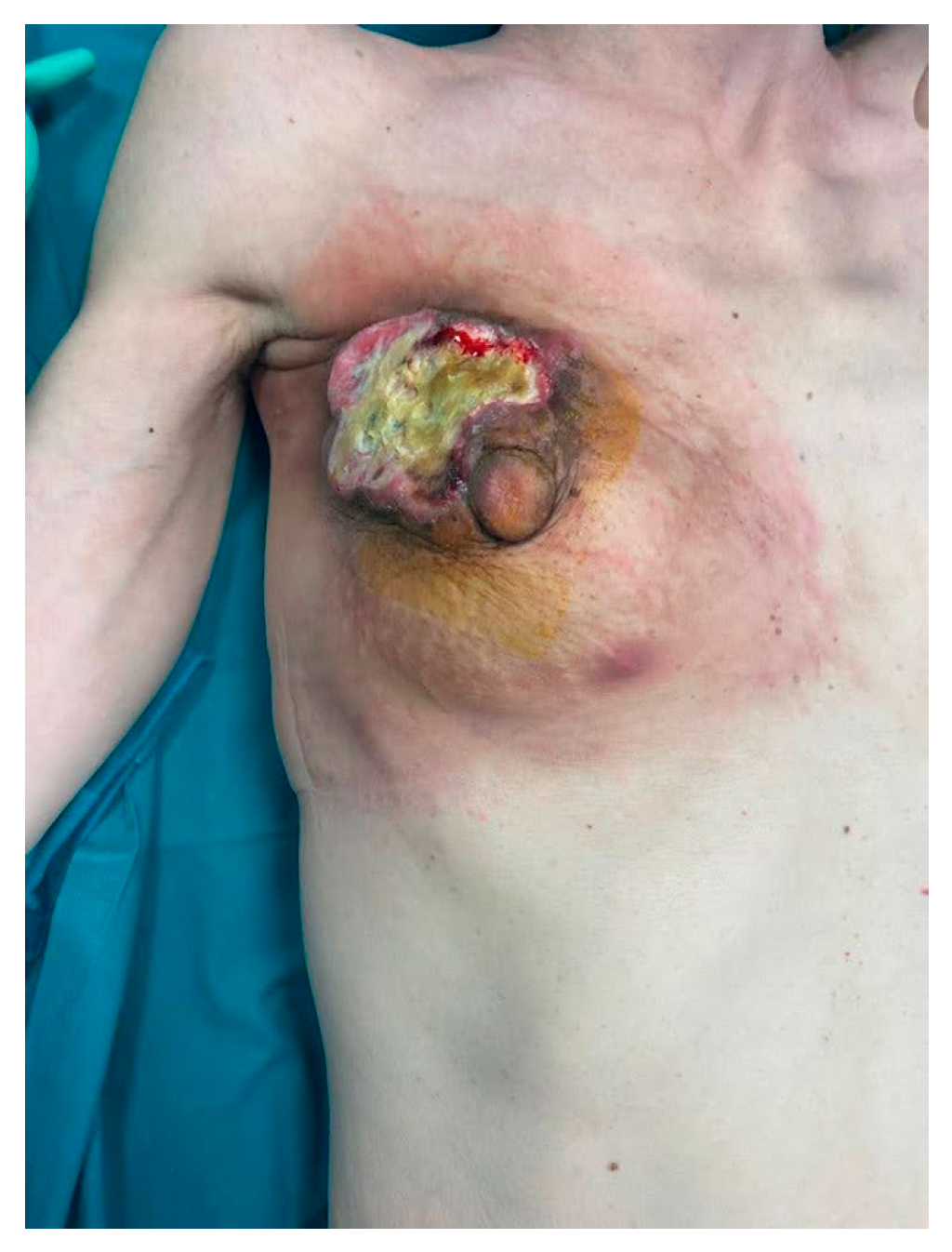
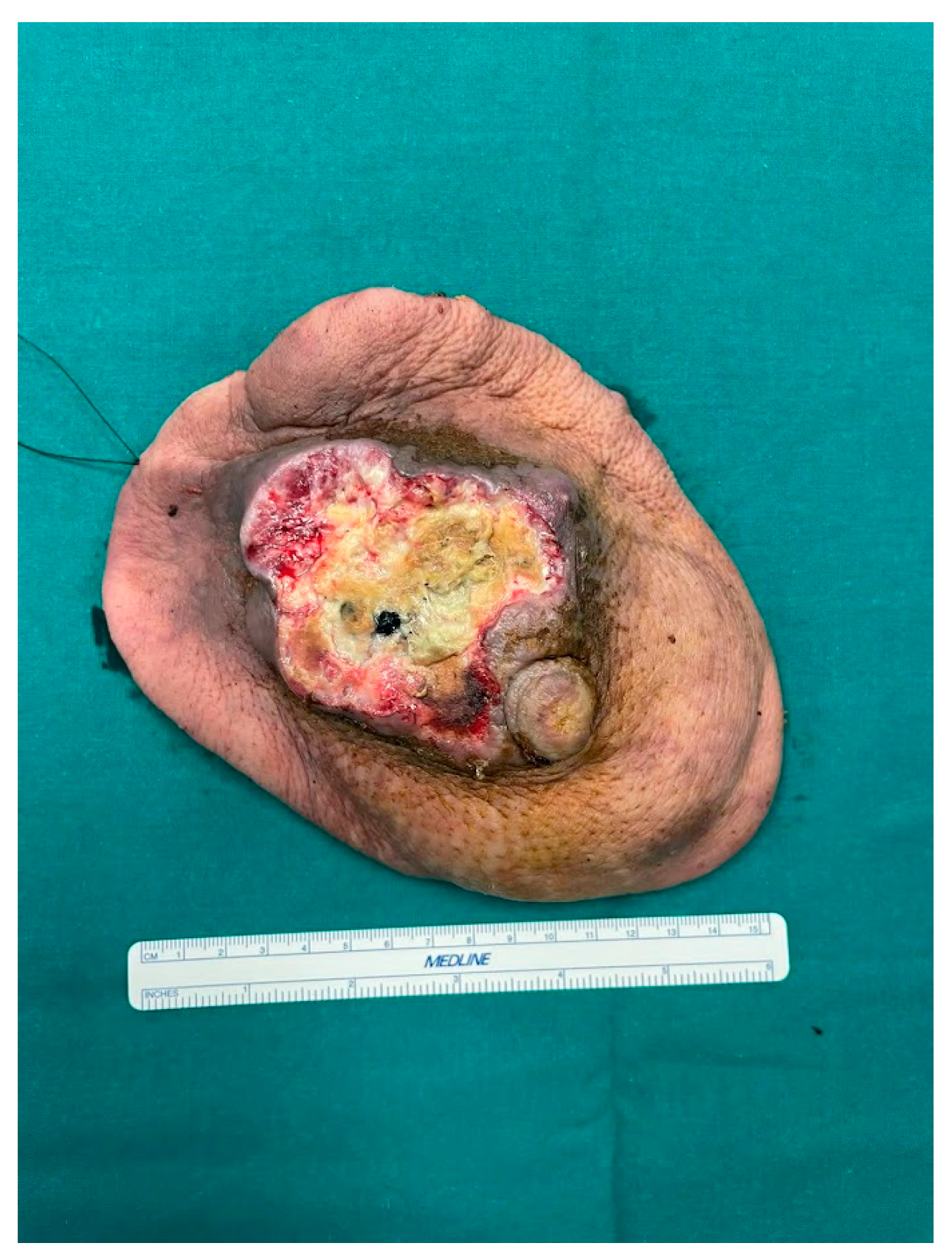

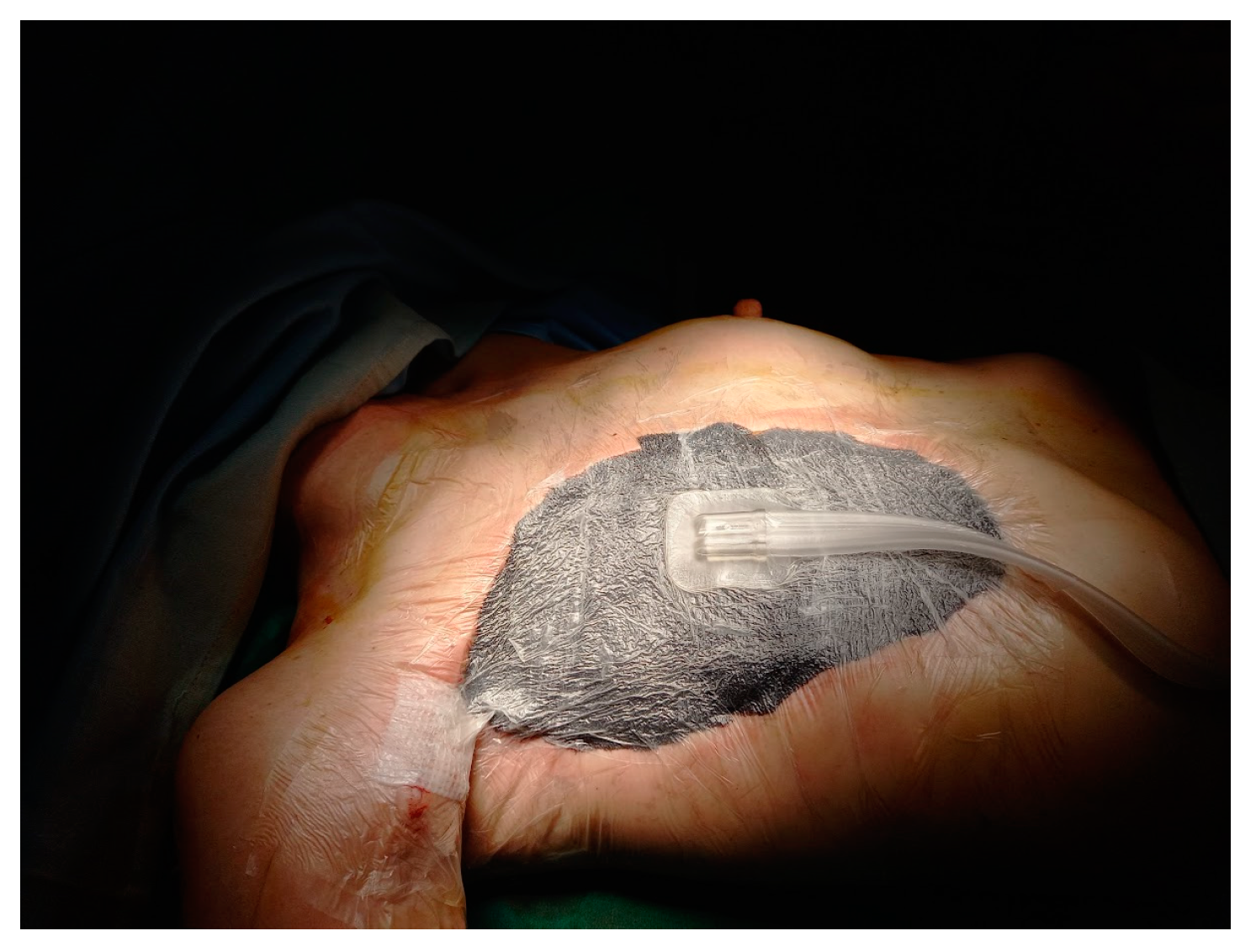



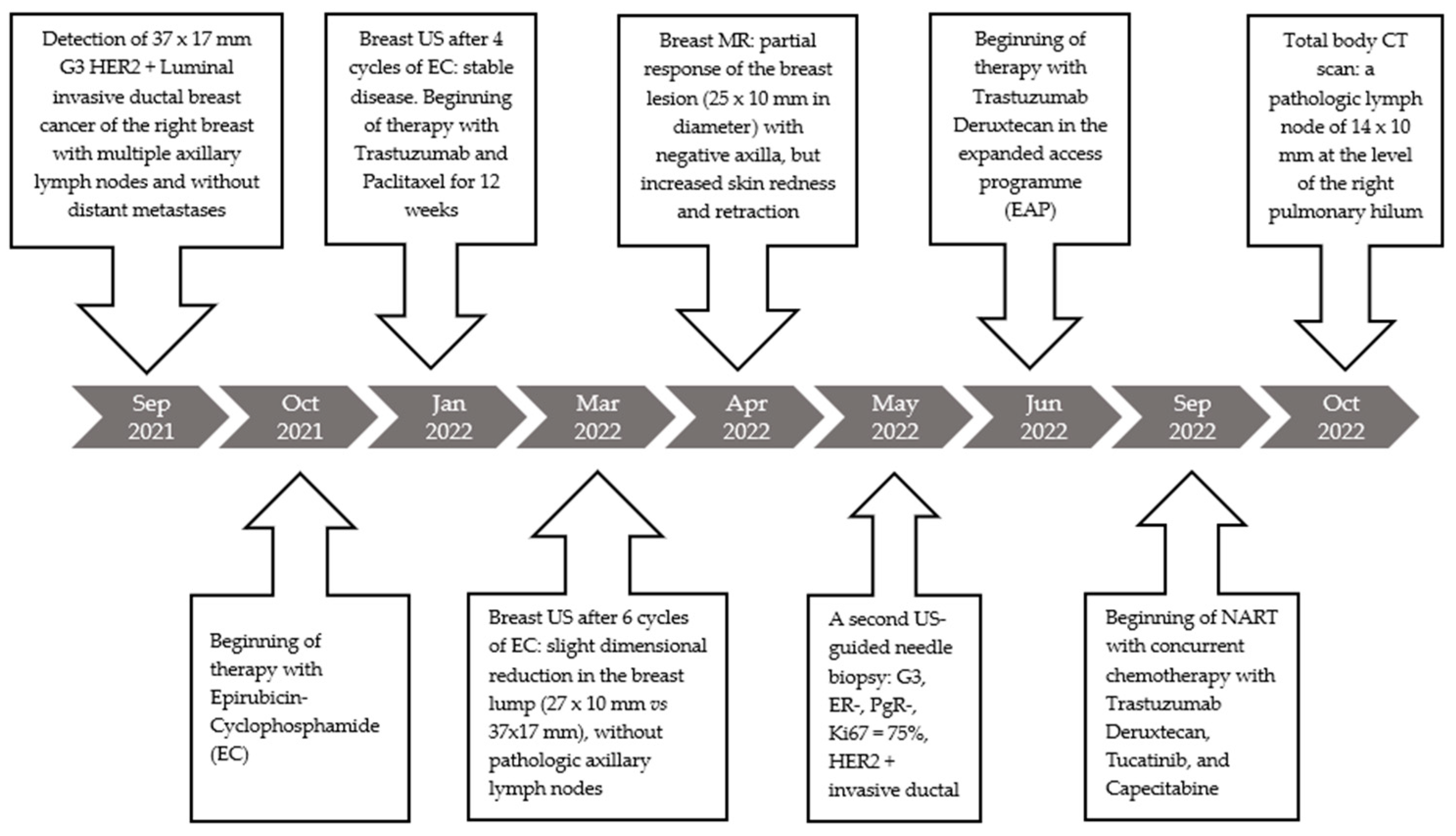
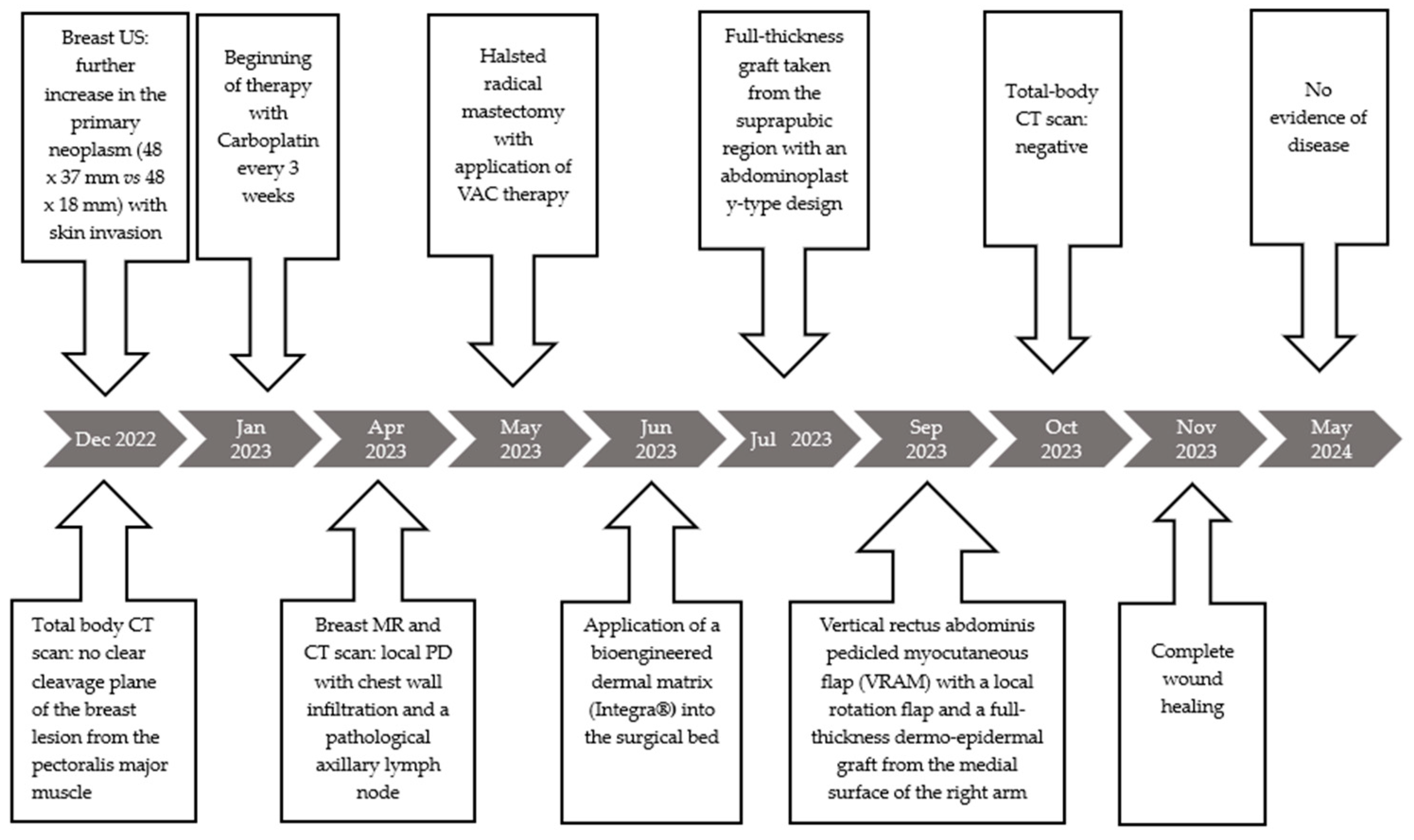
Disclaimer/Publisher’s Note: The statements, opinions and data contained in all publications are solely those of the individual author(s) and contributor(s) and not of MDPI and/or the editor(s). MDPI and/or the editor(s) disclaim responsibility for any injury to people or property resulting from any ideas, methods, instructions or products referred to in the content. |
© 2024 by the authors. Licensee MDPI, Basel, Switzerland. This article is an open access article distributed under the terms and conditions of the Creative Commons Attribution (CC BY) license (https://creativecommons.org/licenses/by/4.0/).
Share and Cite
Cuniolo, L.; Gipponi, M.; Murelli, F.; Depaoli, F.; Cornacchia, C.; Franchelli, S.; Pesce, M.; Ronda, E.; Picardi, S.; Diaz, R.; et al. Multidisciplinary and Tailored Treatment of Locally Advanced Breast Cancer in Progression during Neoadjuvant Chemotherapy: Case Report. Curr. Oncol. 2024, 31, 2856-2866. https://doi.org/10.3390/curroncol31050217
Cuniolo L, Gipponi M, Murelli F, Depaoli F, Cornacchia C, Franchelli S, Pesce M, Ronda E, Picardi S, Diaz R, et al. Multidisciplinary and Tailored Treatment of Locally Advanced Breast Cancer in Progression during Neoadjuvant Chemotherapy: Case Report. Current Oncology. 2024; 31(5):2856-2866. https://doi.org/10.3390/curroncol31050217
Chicago/Turabian StyleCuniolo, Letizia, Marco Gipponi, Federica Murelli, Francesca Depaoli, Chiara Cornacchia, Simonetta Franchelli, Marianna Pesce, Elena Ronda, Stefano Picardi, Raquel Diaz, and et al. 2024. "Multidisciplinary and Tailored Treatment of Locally Advanced Breast Cancer in Progression during Neoadjuvant Chemotherapy: Case Report" Current Oncology 31, no. 5: 2856-2866. https://doi.org/10.3390/curroncol31050217
APA StyleCuniolo, L., Gipponi, M., Murelli, F., Depaoli, F., Cornacchia, C., Franchelli, S., Pesce, M., Ronda, E., Picardi, S., Diaz, R., Poggio, F., Friedman, D., De Cian, F., & Fregatti, P. (2024). Multidisciplinary and Tailored Treatment of Locally Advanced Breast Cancer in Progression during Neoadjuvant Chemotherapy: Case Report. Current Oncology, 31(5), 2856-2866. https://doi.org/10.3390/curroncol31050217





